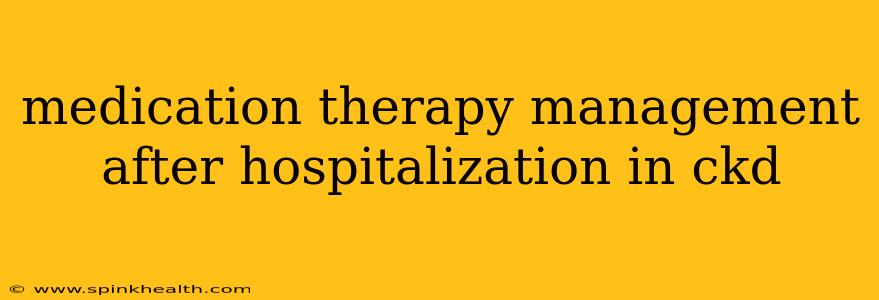Chronic kidney disease (CKD) requires careful management, and hospitalization often disrupts the delicate balance of medications and care. This is where medication therapy management (MTM) steps in, acting as a crucial bridge to help patients transition smoothly back into their lives and manage their condition effectively. It's more than just taking pills; it's about understanding why you're taking them and how they interact with your overall health. Let's explore the vital role of MTM after a CKD hospitalization.
What is Medication Therapy Management (MTM)?
Imagine a dedicated pharmacist, not just dispensing your prescriptions, but actively partnering with you and your doctor to optimize your medication regimen. That’s the essence of MTM. It involves a comprehensive review of all your medications, identifying potential problems, and developing a plan to ensure you take your medications safely and effectively. This is particularly crucial for individuals with CKD, whose medication needs are complex and often change due to the progression of the disease.
Why is MTM Important After Hospitalization for CKD?
Hospital stays can significantly alter a CKD patient's medication regimen. New medications might be introduced, existing ones adjusted, or some discontinued. The risk of medication errors increases, particularly with polypharmacy (taking many medications simultaneously), a common occurrence in CKD. MTM helps mitigate these risks and ensure a smooth transition back home.
What are the common medication-related problems after hospitalization in CKD patients?
This is a crucial question, and sadly, quite common. Many CKD patients experience a cascade of medication-related problems after a hospital stay. These can include:
- Medication errors: Incorrect dosages, missed doses, or interactions between medications are all too common. The hospital setting, with its hectic pace, can increase the chance of mistakes.
- New medications: Hospitalization frequently leads to the introduction of new medications to treat acute issues, which then need to be integrated into the existing regimen.
- Changes in existing medications: Dosages may need adjusting based on kidney function changes or other factors discovered during the hospitalization.
- Drug interactions: Mixing new medications with existing ones can create dangerous interactions, requiring careful monitoring and adjustments.
- Adverse drug reactions: Some medications can cause unwanted side effects, which need prompt identification and management.
- Poor adherence: Understanding the complex regimen and its rationale is critical for effective adherence, something that can easily be disrupted during and after a hospitalization.
How can MTM services improve medication adherence after discharge for CKD patients?
MTM plays a pivotal role in improving medication adherence in several ways:
- Personalized education: Pharmacists provide clear, patient-friendly explanations of each medication, its purpose, dosage, potential side effects, and how to take it correctly.
- Reconciliation of medications: MTM services ensure that all medications taken before, during, and after hospitalization are accurately documented and reconciled to avoid duplication, omission, or interactions.
- Follow-up and monitoring: Regular check-ins ensure that patients are taking their medications as prescribed and that any problems are addressed promptly.
- Improved communication: MTM services facilitate better communication between patients, physicians, and pharmacists, ensuring everyone is on the same page.
What specific MTM services are beneficial for CKD patients after discharge?
Several specific MTM services prove particularly beneficial for CKD patients recovering from hospitalization:
- Comprehensive medication review: A thorough review of all medications, including over-the-counter drugs and supplements, identifies potential problems and optimizes the regimen.
- Development of a personalized medication action plan: This plan outlines clear instructions for taking medications, managing side effects, and when to contact healthcare providers.
- Education on potential drug interactions: Understanding potential interactions helps patients avoid dangerous combinations and report any concerns promptly.
- Adherence counseling: Tailored strategies to improve medication adherence, considering individual circumstances and challenges.
- Disease state management education: Focusing on CKD management, diet, and lifestyle choices alongside medication.
How can I access medication therapy management services after discharge from the hospital for my CKD?
Accessing MTM services varies depending on your location and health insurance coverage. Speak to your doctor or pharmacist; they can help determine if MTM is right for you and guide you on how to access these services. Many hospitals and healthcare systems offer MTM programs as part of their discharge planning. Don’t hesitate to ask!
In conclusion, medication therapy management is not merely a supplementary service; it's an essential component of comprehensive CKD care, particularly after hospitalization. By proactively addressing medication-related challenges, MTM significantly improves patient outcomes, enhances quality of life, and helps patients navigate the complexities of managing their chronic condition. Remember, your active participation in your care is key; don't hesitate to ask questions and advocate for yourself.

